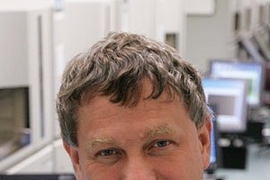The following is adapted from a press release issued today by the American Association for the Advancement of Science.
Geneticist, molecular biologist, and mathematician Eric Steven Lander — president and founding director of the Eli and Edythe L. Broad Institute of MIT and Harvard University, and a principal leader of the historic international Human Genome Project — is the winner of the 2015 Philip Hauge Abelson Prize given by the American Association for the Advancement of Science (AAAS).
Lander is being honored by AAAS for advancing science in society through his “extraordinary contributions to science,” and for “his ability to explain science to the public and students,” as well as “his work bringing science to bear in serving the public.” The award will be presented Feb. 12 during the 182nd AAAS Annual Meeting in Washington.
In addition to leading the Broad Institute, Lander is a professor of biology at MIT and a professor of systems biology at the Harvard Medical School. Lander is co-chair of the President’s Council of Advisors on Science and Technology (PCAST), appointed in 2008 by President Barack Obama. PCAST provides direct advice to the president on matters of science and technology and during Lander’s tenure has prepared 27 advisory reports on topics from antibiotic resistance and how best to prepare for pandemics, to advanced manufacturing and energy policy.
As a scientist, one of Lander’s seminal achievements was the sequencing and interpretation of the human genome, which changed the course of biological research by providing an inventory of human genes and a reference for human genetic variation as well as conserved genetic elements. In a nomination letter, Duke University Research Professor Robert Cook-Deegan, a visiting professor at Arizona State University, noted that “Dr. Lander played a key role in the Human Genome Project (HGP) from its earliest stages, from his fundamental work on methods to create genetic and physical maps to the successful completion of a finished sequence, for which he directed the flagship center that produced one-third of the project’s data.”
Cook-Deegan’s nomination letter also cited Lander’s many other contributions to genomics and biomedicine, from the first sequencing of the mouse genome to the development of new methods and standards for whole-genome sequencing as well as new methods for studying the three-dimensional folding structure of genomes.
The Abelson Prize was inspired by the late Philip Hauge Abelson, long-time senior advisor to AAAS and editor of Science. Abelson, who served as president of the Carnegie Institution of Washington, died August 1, 2004, following more than 60 years of service to science and society. The award is given annually to either a public servant, in recognition of sustained exceptional contributions to advancing science, or to a scientist whose career has been distinguished both for scientific achievement, and for other notable services to the scientific community. Established in 1985 by the AAAS Board of Directors, the award consists of a commemorative medallion and an honorarium of $5,000.
Lander was also lauded for his exceptional skill as a science communicator, and for his contributions to science policy. “Prof. Lander’s ability to explain highly technical science to a nontechnical audience is nonpareil,” Cook-Deegan wrote in his nomination letter. Specifically, Lander has written many influential position pieces for scholarly publications on complex scientific and bioethical issues, from precision medicine to germline editing. He further has written for popular media outlets such as The New York Times, provided public-engagement talks at events such as the World Science Festival, testified as a pro bono expert witness in one of the first legal cases involving DNA fingerprinting, and wrote an influential friend-of-the-court brief in a recent U.S. Supreme Court case on gene patenting.
Born in Brooklyn, N.Y. in 1957, Lander attended Stuyvesant High School in Manhattan. He earned a BA with highest honors in mathematics from Princeton University in 1978, and a PhD in mathematics from Oxford University in 1981, which he attended as a Rhodes Scholar. He was an assistant and associate professor of managerial economics at the Harvard Business School from 1981 to 1990. He served as a Whitehead Fellow from 1986 to 1989. In 1990, Lander became professor of biology at MIT and a member of the Whitehead Institute. He founded the Whitehead/MIT Center for Human Genome Research, which was both a flagship of and leading contributor to the Human Genome Project, and which also became a cornerstone of the new Broad Institute.
Lander’s honors and awards include the MacArthur Foundation Prize Fellowship in 1987, the Woodrow Wilson Prize for Public Service from Princeton University in 1998, the City of Medicine Award in 2001, the Gairdner Foundation International Award of Canada in 2002, the AAAS Award for Public Understanding of Science and Technology in 2004, and the Breakthrough Prize in Life Sciences in 2013. He was named by Time magazine as one of the 100 most influential people in the world in 2004 and by U.S. News and World Report as one of America’s top 20 leaders in 2006. He was elected a member of the U.S. National Academy of Sciences in 1997 and of the U.S. Institute of Medicine in 1999. He has received honorary degrees from 10 colleges and universities, and has served on governing and advisory boards for various government agencies, academic institutions, scientific societies, and corporations.
The Abelson Prize will be bestowed upon Lander during the 182nd AAAS Annual Meeting in Washington Feb. 11-15. The AAAS Awards Ceremony and Reception will be held at 6:30 p.m. on Friday, Feb. 12, in Palladian Ballroom of the Omni Shoreham Hotel.









